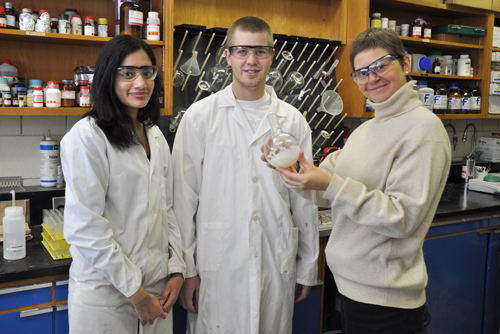
Researchers at the University of Guelph are trying to develop a cancer vaccine that would help the body’s immune system recognize and attack tumour cells. The vaccine would be used to attack any tumour cells that remain in the body after cancer surgery. Unlike chemotherapy, the vaccine would target only abnormal cells.
“The problem with chemotherapy is cell selectivity,” says Prof. France-Isabelle Auzanneau, Department of Chemistry. “It’s the same problem with this vaccine. We’re trying to get something that is as selective as possible to avoid collateral damage.”
Tumour cells and bacteria both have sugar molecules on their surfaces. To fight bacteria, vaccines help the body recognize sugars attached to the surface of bacteria and trigger an immune response.
“Tumour cells have sugars on their surfaces that are abnormal structures. We’re trying to identify and characterize them so that we can use them in the same context,” says Auzanneau. “The hope is that it would lead to anti-cancer vaccines.”
During fetal development, these sugars play a role in cell development, differentiation and multiplication. After birth, the sugars stop expressing themselves because they are no longer needed for cell differentiation.
“When there is an occurrence of cancer or genetic mutation, suddenly the machinery in those cells goes crazy and they start re-expressing these sugars,” says Auzanneau. “The cell multiplication system goes AWOL. They start multiplying as if they were in the context of embryonic development.”
The goal of the vaccine is to train the body to attack abnormal cells that are re-expressing sugars while leaving healthy cells alone.
Sugars serve a variety of purposes within cells. One type of sugar, found in the cellulose of plant cells, provides structural support. Sugars like glycogen and sucrose are food sources. These sugars also contain biological information, such as blood group or tissue typing, and also play a role in cell differentiation.